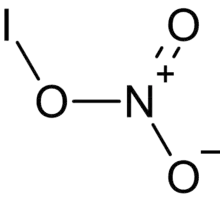 | |
| Names | |
|---|---|
| IUPAC name
iodo nitrate | |
| Identifiers | |
3D model (JSmol) |
|
| ChemSpider | |
PubChem CID |
|
| |
| |
| Properties | |
| INO3 | |
| Molar mass | 188.908 g·mol−1 |
Except where otherwise noted, data are given for materials in their standard state (at 25 °C [77 °F], 100 kPa).
Infobox references | |
Iodine nitrate is a chemical with formula INO3.[1] It is a covalent molecule with a structure of I–O–NO2.[2]
Preparation
The compound was first produced by the reaction of mercury(II) nitrate and iodine in ether.[1]
Other nitrate salts and solvents can also be used.[1]
As a gas it is slightly unstable, decaying with a rate constant of −3.2×10−2 s−1.[2] The possible formation of this chemical in the atmosphere and its ability to destroy ozone have been studied. Potential reactions in this context are:[3]
- IONO2 → IO + NO2
- IONO2 → I + NO3
- I + O3 → IO + O2
References
- 1 2 3 Hassner, Alfred (15 April 2001). "Iodine Nitrate". Encyclopedia of Reagents for Organic Synthesis: ri016. doi:10.1002/047084289X.ri016. ISBN 9780470842898.
- 1 2 Barnes, Ian; Becker, Karl H.; Starcke, Juergen (November 1991). "Fourier-transform IR spectroscopic observation of gaseous nitrosyl iodine, nitryl iodine, and iodine nitrate". The Journal of Physical Chemistry. 95 (24): 9736–9740. doi:10.1021/j100177a026.
- ↑ Allan, B. J.; Plane, J. M. C. (September 2002). "A Study of the Recombination of IO with NO2 and the Stability of INO3: Implications for the Atmospheric Chemistry of Iodine". The Journal of Physical Chemistry A. 106 (37): 8634–8641. Bibcode:2002JPCA..106.8634A. doi:10.1021/jp020089q.
This article is issued from Wikipedia. The text is licensed under Creative Commons - Attribution - Sharealike. Additional terms may apply for the media files.